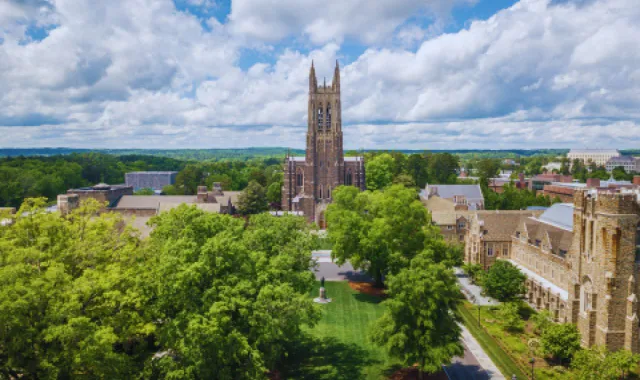Duke University stands today as one of the foremost centers of learning, research, and global collaboration in the world. Established in 1838 and relocated to Durham, North Carolina, in 1892, Duke has evolved from a small regional college into a comprehensive research university recognized for its academic rigor and international outlook. Guided by its motto Eruditio et Religio—“Knowledge and Faith”—the institution embodies a balance between intellectual exploration and ethical responsibility.
Over nearly two centuries, Duke has built a reputation that merges scholarly excellence with community engagement, technological innovation, and global leadership. Its campus serves not only as an academic hub but also as a living laboratory of ideas where scholars, scientists, and students collaborate to address the challenges of the twenty-first century.
A Legacy of Knowledge and Innovation
The foundation of Duke University traces back to the early Methodist and Quaker traditions that valued education as a means of personal growth and social progress. What began as Brown’s Schoolhouse in rural Randolph County transformed over time into a world-renowned university. The relocation to Durham was largely enabled by the philanthropic vision of the Duke family—particularly Washington Duke and James Buchanan Duke—whose endowments and foresight shaped the university’s early growth.
The institution’s architectural grandeur, characterized by its Collegiate Gothic style and dominated by the iconic Duke Chapel, reflects both tradition and aspiration. Academically, Duke set new benchmarks in the twentieth century by integrating research excellence into its educational model. The establishment of the Duke University Medical Center in 1930 and later the Fuqua School of Business, Pratt School of Engineering, and Sanford School of Public Policy reinforced its multidisciplinary approach.
From the outset, Duke envisioned education as a force for societal transformation. Its emphasis on innovation has led to pioneering advances in medicine, engineering, environmental sciences, and digital technology. The university’s dedication to intellectual freedom and inquiry has also made it a fertile ground for debates on ethics, sustainability, and the global responsibilities of higher education. This heritage of progress defines Duke not only as an American institution but also as a participant in the worldwide pursuit of knowledge.
Academic Brilliance and Global Recognition
Duke University’s academic ecosystem reflects the symbiosis between teaching and discovery. The institution houses ten schools and colleges, each of which contributes to the university’s reputation for interdisciplinary excellence. The Trinity College of Arts & Sciences fosters critical thinking and liberal learning, while the Pratt School of Engineering integrates design, sustainability, and technological innovation. The School of Medicine consistently ranks among the top five in the United States for research productivity, and the Fuqua School of Business is globally recognized for its MBA and executive programs emphasizing ethical leadership.
Beyond individual rankings, Duke’s position in global league tables demonstrates its sustained performance. It regularly appears in the Top 10–15 U.S. universities and among the Top 25 worldwide, recognized by organizations such as QS, Times Higher Education, and U.S. News & World Report. These achievements stem from rigorous academic standards, selective admissions, and a research-driven curriculum that encourages collaboration between students and faculty.
The university’s faculty includes Nobel laureates, MacArthur Fellows, and distinguished researchers whose work shapes disciplines from biomedical engineering to international law. Duke also emphasizes experiential learning—students participate in research projects, internships, and global fieldwork that connect classroom theories with real-world applications.
Moreover, Duke’s global partnerships—with institutions in China, Singapore, Europe, and Africa—enable cross-cultural exchange and collaborative scholarship. Through these networks, students and researchers address pressing global issues such as healthcare inequality, climate change, and digital ethics. The blend of local engagement and global perspective gives Duke its distinctive identity as a university that not only generates knowledge but also applies it to serve humanity.
Excellence in Research and Innovation
Research forms the core of Duke University’s mission. With an annual research budget exceeding $1.3 billion, the institution drives innovation across sciences, humanities, and technology. Duke Health and the Duke University Medical Center stand at the forefront of medical discovery—advancing treatments for cancer, neurological disorders, cardiovascular disease, and infectious illnesses. The integration of medicine, engineering, and computational sciences has produced breakthroughs in genomics, artificial intelligence, robotics, and regenerative medicine.
Duke’s Office of Research and Innovation coordinates interdisciplinary initiatives, fostering collaboration between departments and external partners. The Duke Global Health Institute operates projects in more than 40 countries, addressing issues from maternal health to pandemic preparedness. In environmental research, the Nicholas School of the Environment leads studies on sustainable energy and marine ecosystems, while the Duke Energy Initiative focuses on transitioning to clean power systems.
A hallmark of Duke’s research culture is student inclusion. Undergraduate students frequently work alongside faculty in laboratories and field studies, gaining exposure to advanced methods early in their academic careers. Graduate and postdoctoral researchers, supported by fellowships and endowments, contribute to high-impact publications and global conferences.
The university’s collaborations with major corporations and governmental agencies—such as NASA, NIH, and Microsoft Research—further amplify its impact. Patents, start-ups, and public-private ventures emerging from Duke laboratories have fueled technological entrepreneurship in the Research Triangle region and beyond.
This commitment to research excellence not only strengthens Duke’s academic reputation but also reinforces its role as a catalyst for global progress. By blending scientific inquiry with ethical reflection, the university ensures that innovation serves the public good.
Duke University Research Highlights and Global Programs
| Category | Focus Area | Impact / Achievement |
| Biomedical Research | Cancer Therapy & Genomics | Development of targeted gene treatments |
| Engineering & AI | Robotics & Data Science | Advanced AI applications for medicine and industry |
| Environmental Studies | Climate Change & Sustainability | Leading international policy research on energy |
| Global Education | Duke Kunshan & Study Abroad | Students from 100+ countries engaged in dual degree programs |
Duke’s Global Education Approach

Global education at Duke University is not an afterthought — it is a defining pillar of its academic philosophy. Duke’s leadership recognizes that solving the world’s most pressing issues requires diverse perspectives, cultural understanding, and cross-border collaboration. Through a rich network of international programs, Duke has become a global classroom without walls.
A major example is Duke Kunshan University (DKU) in China — a joint venture between Duke University and Wuhan University. DKU represents an innovative model of higher education that blends American liberal arts traditions with Chinese academic rigor. Students from over 50 nations study there, earning dual degrees recognized in both countries. This partnership strengthens Duke’s global footprint and promotes cultural exchange, critical thinking, and leadership in a transnational setting.
Beyond DKU, Duke’s Global Education Office oversees study-abroad opportunities in more than 40 countries, allowing undergraduates to engage in immersive academic and service-learning experiences. These programs emphasize real-world problem-solving, often tied to sustainability, global health, and social justice.
The Office of University Scholars and Fellows (OUSF) also fosters global education by supporting prestigious scholarships such as the Rhodes, Marshall, and Fulbright. Such initiatives ensure that Duke students can apply their education to worldwide challenges.
Moreover, the DukeEngage Program epitomizes Duke’s belief in learning through service. Each summer, thousands of students work in underserved communities around the world, applying classroom knowledge to social impact projects. Whether addressing clean water access in Africa, public health in Asia, or education equity in Latin America, DukeEngage turns academic theory into compassionate action.
Duke’s global education model thus cultivates more than intellectual ability; it fosters empathy, adaptability, and cultural fluency. By preparing students to navigate an interconnected world, Duke reinforces its mission of “knowledge in the service of society.”
Campus Life and Student Experience
The campus of Duke University is both a historic landmark and a modern ecosystem of innovation. Spread across 8,600 acres, it features Gothic architecture harmonized with cutting-edge research facilities. The heart of the university, the Duke Chapel, stands as a symbol of unity, scholarship, and spiritual reflection.
Student life at Duke extends far beyond classrooms. The university offers more than 400 student organizations encompassing academic, cultural, athletic, and volunteer interests. Clubs such as the Duke Student Government, International Association, and Engineering Society allow students to develop leadership, teamwork, and community values.
Athletics play a central role in campus spirit, with the Duke Blue Devils representing the university in NCAA Division I competitions. Duke’s men’s basketball team, led by legendary coaches like Mike Krzyzewski, has achieved national and international fame, uniting students and alumni under a shared banner of pride and tradition.
Residential life is equally dynamic. First-year students live on East Campus, fostering close community ties, while upperclassmen reside on West Campus or in living-learning communities. Duke’s focus on well-being is evident through initiatives in mental health, sustainable dining, and recreation centers that promote physical and emotional balance.
The campus also hosts annual cultural events such as the Duke Arts Festival and LDOC (Last Day of Classes), celebrating creativity and student achievement. Together, these elements create an atmosphere of inclusivity, inspiration, and personal growth — a microcosm of Duke’s larger mission to develop holistic individuals ready to impact the world.
Admissions, Courses, and Scholarships

Admission to Duke University is highly competitive, reflecting its status among the world’s premier institutions. The university seeks not only academic excellence but also curiosity, leadership, and integrity in its applicants.
Undergraduate Admissions are handled through the Trinity College of Arts & Sciences and the Pratt School of Engineering. Duke practices a holistic evaluation process, considering GPA, standardized test scores (SAT/ACT — though optional in some cycles), recommendation letters, extracurricular engagement, and personal essays. International applicants must demonstrate English proficiency through TOEFL or IELTS scores.
Duke offers over 50 undergraduate majors, ranging from Computer Science, Economics, and Public Policy to Neuroscience and Environmental Science. Graduate programs include world-class degrees in Medicine, Law, Business (Fuqua), Divinity, and Engineering.
Scholarships and Financial Aid: Duke is committed to accessibility regardless of economic background. Through programs like the Karsh International Scholarship and the Robertson Scholars Leadership Program, high-achieving students from around the world receive full tuition and stipends. Need-based aid is available for both domestic and international students, reinforcing the university’s inclusive mission.
The Office of Undergraduate Financial Support collaborates with donors and foundations to ensure that deserving students can pursue their academic dreams. Meanwhile, graduate students benefit from fellowships, assistantships, and research grants.
Application Timeline
- Early Decision: November 1
- Regular Decision: January 2
- Financial Aid Deadline: February 1
Duke’s admissions philosophy aligns with its broader goal — to cultivate leaders capable of combining knowledge with purpose. Students are encouraged to explore interdisciplinary pathways, contributing to research, ethics, and global innovation.
Alumni Network and Global Influence
The Duke University alumni network is one of its greatest assets — a global community of over 190,000 members spanning more than 150 countries. From CEOs and Nobel laureates to diplomats and artists, Duke alumni embody the institution’s vision of leadership through service and excellence.
Among the university’s distinguished alumni are Tim Cook, CEO of Apple Inc.; Melinda French Gates, co-founder of the Bill & Melinda Gates Foundation; Richard Nixon, the 37th President of the United States; and Elizabeth Dole, former U.S. Senator and cabinet member.
This diverse list highlights Duke’s capacity to nurture individuals who make transformative impacts in business, science, public policy, and humanitarian work. Alumni actively contribute to mentoring current students, funding scholarships, and supporting research initiatives through the Duke Alumni Association (DAA).
Duke’s alumni events — such as Reunion Weekends and Blue Devil Days — foster lifelong connections that transcend borders. The university’s global chapters in cities like London, Singapore, and Dubai provide networking platforms for professionals and entrepreneurs.
Through philanthropy and advocacy, alumni continue to shape Duke’s evolution. Their involvement not only enhances institutional resources but also reinforces Duke’s ethos: that education’s ultimate purpose is to create positive, sustainable change in the world.
Future Vision: Duke University 2030
Duke University’s strategic plan, “Duke Forward 2030,” envisions a future rooted in innovation, inclusion, and global engagement. This blueprint aims to position Duke as a University Without Borders, integrating digital learning, sustainable development, and multidisciplinary research.
In research, Duke plans to expand its leadership in AI-driven healthcare, renewable energy, and social equity studies. The university’s Climate Commitment Initiative seeks to achieve carbon neutrality and foster environmental stewardship through education and policy innovation.
Academically, Duke is enhancing online and hybrid programs to make world-class education more accessible globally. The integration of artificial intelligence into teaching, data analytics for learning improvement, and virtual research labs is transforming how knowledge is shared.
The university also emphasizes ethical innovation — ensuring that technological progress serves humanity responsibly. Partnerships with organizations like the United Nations, WHO, and major tech firms will amplify Duke’s contributions to solving global challenges.
FAQs
Q1. What makes Duke University special among global universities?
Ans: Duke combines academic excellence with research innovation and social responsibility. It promotes critical thinking, global citizenship, and leadership with purpose.
Q2. Is Duke University good for international students?
Ans: Yes. Duke welcomes students from over 100 countries, offering scholarships, mentorship, and global study opportunities through Duke Kunshan and study-abroad programs.
Q3. Which programs at Duke University are most popular?
Ans: Duke excels in Medicine, Business, Law, Engineering, and Public Policy. Each combines rigorous academics with real-world application and interdisciplinary learning.
Q4. What is Duke Kunshan University?
Ans: Duke Kunshan University is Duke’s global campus in China, providing joint U.S.–China degrees and fostering multicultural, bilingual, and research-oriented education.
Q5. How does Duke promote research excellence?
Ans: Duke invests over a billion dollars annually in research, supporting interdisciplinary projects in AI, medicine, climate change, and global health innovation.
Final Thoughts

Duke University stands as a beacon of excellence, where tradition meets innovation and intellect meets empathy. Its commitment to research, ethics, and global engagement makes it more than a center of learning — it is a catalyst for change. From its origins in North Carolina to its influence across continents, Duke continues to redefine what it means to educate and inspire.








